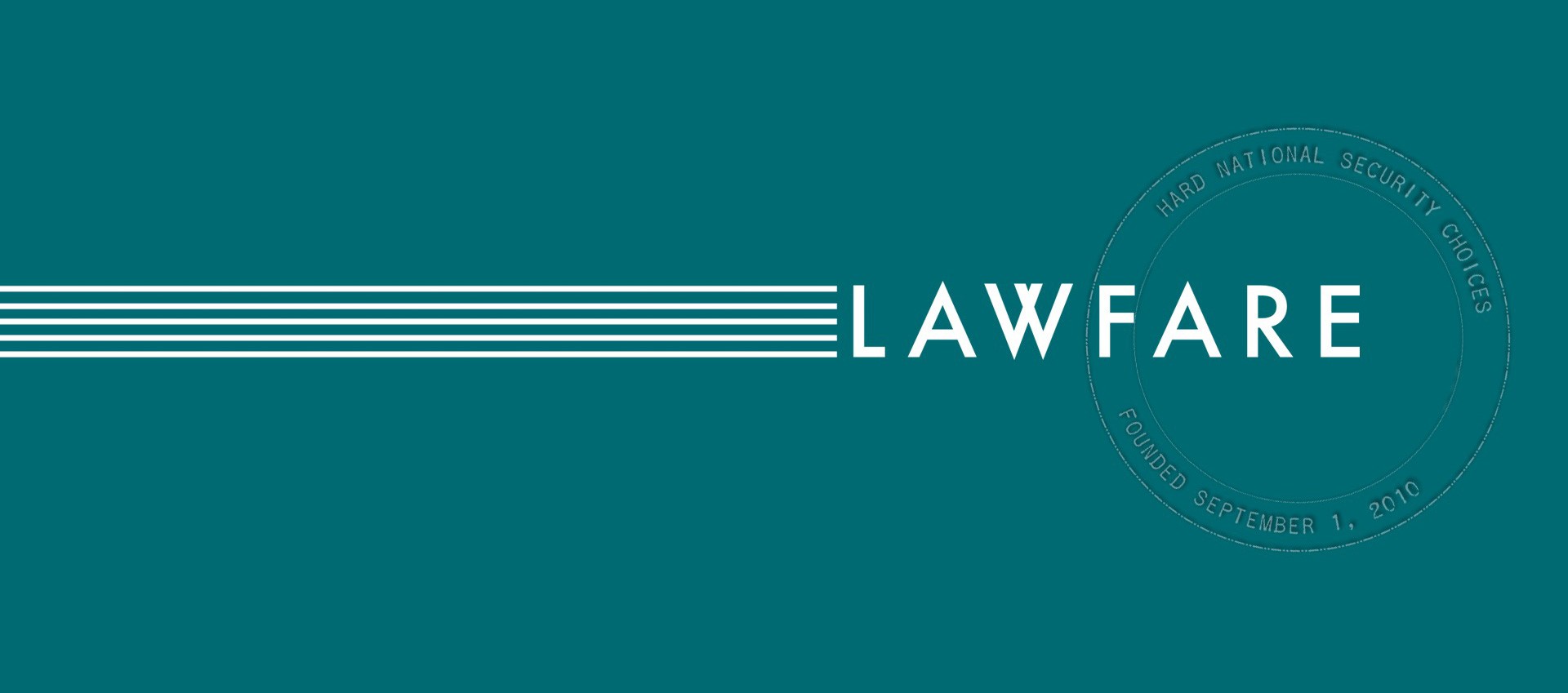The Week That Was: All of Lawfare in One Post

Published by The Lawfare Institute
in Cooperation With

Quinta Jurecic argued that while the transcript of Special Counsel Robert Hur’s report on President Biden’s potential mishandling of classified documents reveals weaknesses in Hur’s report, the way the press covered Hur’s report when it first came out—with a huge focus on Biden’s age—is worse.
On March 15, Benjamin Wittes sat down with Anna Bower and Andrew Fleischman for a live recording of the Lawfare Podcast to discuss Judge Scott McAfee's order granting in part and denying in part the motion to disqualify Willis from the 2020 Georgia election interference case. If you could not attend the live event, the recording is available on Lawfare’s YouTube channel:
Matt Gluck shared an order issued by Judge McAfee in the 2020 Georgia election interference case ruling that Willis can remain on the case if special prosecutor—and Willis’s former romantic partner—Nathan Wade withdraws.
On March 13, Wittes sat down with Bower and Anthony Michael Kreis for another episode of “Lawfare Live: Trump’s Trials and Tribulations,” to discuss Judge McAfee's order quashing six counts in the Fulton County indictment related to the solicitation of violation of oath of office charge due to a lack of sufficient detail. The episode is also available on the Lawfare Podcast:
On the Lawfare Podcast, Jurecic sat down with Roger Parloff, Ned Foley, and Gerard Magliocca to discuss the Supreme Court’s ruling in Trump v. Anderson, which holds that states cannot disqualify former President Donald Trump from appearing on the presidential ballot under Section 3 of the 14th Amendment:
Foley analyzed two different interpretations of the Supreme Court’s decision in Trump v. Anderson. He argued that the Court’s opinions leave open Congress’s ability to disqualify Trump in its joint session on Jan. 6, 2025—even though he thinks it shouldn’t.
Foley’s article is included in Lawfare’s ongoing coverage of Section 3 issues, which you can find on the Trump Disqualification Tracker.
David Lamb and Kathleen Sharkey explained the different interpretations U.S. district judges have had on the term “knowingly” in 18 U.S.C. § 1752, the statute that prosecutors have used to charge defendants in their involvement in the Jan. 6 attack on the U.S. Capitol.
Katherine Pompilio shared Trump’s motion for an adjournment of trial and to exclude evidence of his official acts based on presidential immunity in the criminal case against him in New York.
On March 14, Lawfare launched a new page where you can find all of our coverage of the New York criminal trial against Trump, starting March 25, relating to alleged hush money payments made during and after the 2016 election.
On March 14, Wittes spoke with Bower and Parloff for another episode of “Lawfare Live: Trump’s Trials and Tribulations” to discuss the hearing in Fort Pierce, Florida in front of Judge Aileen Cannon on Trump’s motions to dismiss in the Mar-a-Lago classified documents case. If you could not attend the live event, the recording is available on Lawfare’s YouTube channel or on the Lawfare Podcast feed:
Hyemin Han shared the Supreme Court’s unanimous decision in Lindke v. Freed, which sets out a test for determining whether an official who blocks someone from commenting on the official’s social media post is potentially liable for violating the individual’s First Amendment rights.
On March 1, Lawfare released the fourth episode of season 2 of The Aftermath, a narrative podcast series on the government’s response to the Jan. 6 attack on the U.S. Capitol. Episode 4, “The Hidden Insurrection,” featuring interviews with Jurecic and New York Times reporter Katie Benner—illustrates the Jan. 3, 2021, attempted takeover of the Justice Department and its lasting impact on Jan. 6 prosecutions, department leadership, and institutional integrity. Find the new episode (and previous episodes) on your preferred podcast platform:
Bob Bauer reviewed Geoffrey Berman’s book entitled “Holding the Line,” which details Berman’s conflicts with the Trump administration and his experience as the acting U.S. attorney for the Southern District of New York.
Tyler McBrien reported from Sen. Bob Menendez’s (D-N.J.) arraignment in Manhattan. Menendez pleaded not guilty to new obstruction of justice charges brought by federal prosecutors in the Southern District of New York in connection with alleged bribery and corruption to benefit Egypt and Qatar.
Lindsay Freeman discussed how evidence of Russian cyber-enabled international crimes against Ukraine's critical energy infrastructure could help International Criminal Court prosecutors in their case against Sergei Ivanovich Kobylash and Viktor Nikolayevich Sokolov, by proving that their war crimes leading to grave civilian harm were not isolated, but intended as a broader military policy.
On another episode of the Lawfare Podcast, Wittes spoke with Tim Mak, who has reported on the ground in Ukraine since the beginning of the full-scale invasion. Mak and Wittes discussed the ongoing war two years after the full-scale invasion, whether the Ukrainian military effort is sustainable, the current mood in Ukraine as Congress dithers on aid, and more:
Daniel Franchini and Astrid Iversen assessed the legality, feasibility, and risks of collateralizing frozen Russian assets to provide financial support to Ukraine.
On Rational Security, Scott R. Anderson, Jurecic, and Alan Z. Rozenshtein sat down to talk through the week's big national security news, including Biden’s feisty State of the Union speech, the House bill that will ban TikTok in the fall if it’s Chinese owners do not divest, the policy and legal challenges of sending the ad hoc peacekeeping mission of 1,000 Kenyan police officers to Haiti, and more:
Timothy Edgar described how the government’s use of nationwide search warrants to take down botnets associated with malign foreign governments could jeopardize Americans’ personal information. To address the issue, Edgar asserted that Congress should pass legislation to authorize such operations with appropriate technical and legal restrictions.
On the Lawfare Podcast, Stephanie Pell sat down with Devin DeBacker and Lee Licata to talk about the Biden administration’s new executive order entitled “Preventing Access to Americans’ Bulk Sensitive Personal Data and United States Government-Related Data by Countries of Concern.” They discussed the ways in which the order attempts to prevent certain countries of concern from accessing Americans’ sensitive personal data, the types of data transactions it is intended to regulate, and more:
Aaron Sobel examined why government purchases of Americans’ data from data brokers is outside the scope of Fourth Amendment protection.
Justin Sherman discussed the Federal Trade Commission’s settlement with geolocation data broker, X-Mode Social, in the first article of a two-part analysis. He explained the key takeaways from the historic settlement, the requirements enforced to ensure user consent, and prohibitions surrounding data associated with sensitive locations.
Sherman continued his two-part analysis of the Federal Trade Commission’s (FTC) settlement with geolocation data broker X-Mode Social. He explored how policy makers and legislators can protect Americans from the sale of location data, including what they might learn from the FTC’s use of an innovative “sensitive locations” list.
Also on the Lawfare Podcast, Eugenia Lostri sat down with Daniel Byman, Daniel Linna, and V.S. Subrahmanian to discuss a report they recently published on government use of deep fakes, examining two critical points: the questions that a government agency should address before deploying a deep fake, and the governance mechanisms that should be in place to assess its risks and benefits:
Jim Dempsey and Susan Landau shared their recommendations for the design of government artificial intelligence (AI) systems to ensure that users have the right to know why a decision is made about them and the opportunity to challenge it.
Yonathan Arbel, Ryan Copus, Kevin Frazier, Noam Kolt, Rozenshtein, Peter N. Salib, Chinmayi Sharma, and Matthew Tokson presented questions and a research agenda for legal scholars, policy experts, and AI specialists to address the risks associated with AI.
In the latest edition of the Seriously Risky Business cybersecurity newsletter, Tom Uren discussed Midnight Blizzard’s ongoing breach of Microsoft, reports of a Chinese government directive to reduce the country’s reliance on American technology, and more.
Ryan Scoville assessed why the Justice Department has yet to challenge Texas’s various international agreements on illegal immigration.
Kai Wiggins argued that to improve the accuracy of hate crime statistics, Congress should reform existing legislation—more specifically, the Khalid Jabara and Heather Heyer No Hate Act.
Gia Kokotakis considered how a far-right extremism conspiracy theory about the neo-Nazi group Patriot Front is dangerously undermining the authority of government agencies.
On Chatter, Shane Harris sat down with Benjamin Breen to discuss his new book “Tripping on Utopia,” which details the engrossing history of the roots of the psychedelic movement and the CIA, how anthropologist Margaret Mead was tied to the intelligence agency’s experiments with LSD, the movement she launched to expand human consciousness with her close circle, and more:
And Lawfare launched its crowdfunding campaign to garner support for Lawfare’s Trump Trials, a one-of-a-kind project dedicated to providing in-depth coverage of the ongoing criminal proceedings against Trump in Washington, Florida, New York, and Georgia. To help Lawfare continue its coverage, please consider making a contribution here.
And that was the week that was.



